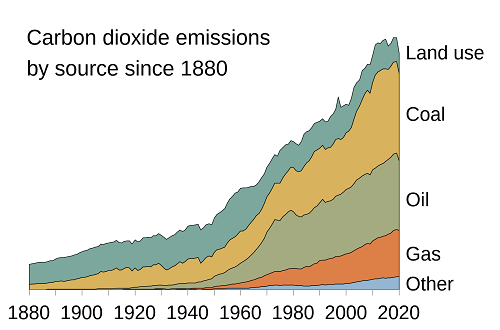
|
Mother Pelican
A Journal of Solidarity and Sustainability
Vol. 18, No. 7, July 2022
Luis T. Gutiérrez, Editor
|
|
|
|

|
|
|
The Deadly Sin of the Human Species
Victor M. Toledo
This article was originally published by
Voices for Mother Earth, 5 June 2022,
REPUBLISHED WITH PEMISSION

"The Global Carbon Project shows how additions to CO2 since 1880 have been caused by different sources ramping up one after another." Source:
Climate Change, Wikipedia.
Click the image to enlarge.
|
|
The maxim "to live in order not to sin is to die and sin," was uttered during an interview by Bibi Andersson, the famous Swedish actress from Ingmar Bergman's films, which rocked an entire generation back in the 1960s. Unwittingly, the maxim defines the key mechanism of the therapy employed by Christianity for centuries. The problem is not sinning, but not being forgiven. And forgiveness is gained by accepting the fault and committing not to repeat it before an omnipotent being, before a superior entity (God), which is gained through confession.
It is about recognizing that because we are imperfect, we are all sinners by definition. Sins are a normal part of existence. We sin when we fall into temptation. Temptation is caused by demons, and demons are the life force, the animal part of the human being, or the vigorous torrent of nature. Sinning and being forgiven is the gradual process of perfecting yourself by trial and error. Additionally, the lack of forgiveness paralyzes the sinner with feelings of guilt. He who does not sin does not move forward. Only the humble accept their sins and beg forgiveness.
Only those who ask for forgiveness and forgive are saved, those who feel compassion for themselves and others. Asking for forgiveness, then, is the supreme act of humility and compassion, and the path to perfection. Lo and behold, modern beings — proud, arrogant, individualistic, materialistic and hedonistic, engendered by industrial, capitalist, technocratic and patriarchal civilization — are prevented from entering this virtuous process. Possessed by the devil, they find themselves trapped in a cage of their own contradictions. This largely explains the existential crisis.
This long spiel was necessary to consider what happens when we go from individuals to the whole of humanity or the human species. Modernity has not only turned the world into a gigantic casino, but into the greatest carnival of deadly sins (pride, greed, lust, anger, gluttony, envy and sloth) in all of history, which has led humanity to a global crisis with its planetary environment that threatens its very existence. Is there a collective sin above those seven? The answer is yes, and this is where science comes into the picture.
To understand the imbalance that humanity has wreaked on the planet's climate, it is necessary to understand the contributions of hundreds of scientists in recent decades. It has to do with paleoclimatology, which studies the climatic characteristics of the Earth throughout its history. Paleoclimatology uses a multitude of techniques to deduce the climates of the past: the fossil record, the accumulation of sediments on the seabed, the air bubbles captured in glaciers, the erosive marks on rocks, and the growth marks on trees and on coral rings.
With these indicators, science arrives at a panorama of what happened in the different periods.
Although the climate record goes back 500 million years, the most reliable available data is for the last 800,000! Ultimately, this is what is most interesting, since Homo sapiens has existed for 300,000 years. In the last 420,000 years, there have been four glacial periods (low temperatures) and five interglacial periods (high temperatures), including the current one in which we have been able to enjoy a mild climate for at least 11,000 years.
During this period, the amount of carbon dioxide (CO2) in the atmosphere fluctuated regularly between 180 and 300 parts per million (ppm) until 1950. Since then, CO2 has increased every year until in 2018 it reached an alarming 410 ppm. This single factor has caused the global climate crisis: floods, hurricanes, cyclones and typhoons, extreme temperatures, droughts, forest fires, melting glaciers, reduction of polar ice caps and severe damage to flora and fauna of the world.
This is the deadly sin of the human species, which, as everything indicates, will lead to global collapse in a few decades.
Picking up on the earlier viewpoint, humanity as a whole must accept its sin in order to seek to overcome it through mechanisms to stop the imbalance that, as we have seen in previous essays, is the result of industrial civilization: the use of oil and other fossil fuels, and an [economic] model based on capitalism and technoscience.
But, as the movie “Don't Look Up” (Netflix) elegantly showed, how do you avoid the path to disaster with the arrogant beings who run the world today? How is it to be achieved with individuals dedicated to seeking political and/or economic power?
The recognition of Mother Earth, a vision inherited from indigenous peoples, which is gaining popularity among the citizens of the world, seems to be the path that moves action and feeds hope.
Translated by Jane K. Brundage from the article, El Pecado Capital de la Especie Humana, Victor M. Toledo,
La Jornada, 31 May 2022.
|
ABOUT THE AUTHOR
Victor M. Toledo, research scientist at the Institute for Ecosystem and Sustainability Research (Instituto de Investigaciones en Ecosistemas y Sustentabilidad), Morelia Campus UNAM, is a Mexican biologist with PhD from the National Autonomous University of Mexico (UNAM). Dr. Toledo has combined his scientific training with studies in economic policies, agrarian cultures and rural sociology. An expert in ethnoecology (the cross-cultural study of how people perceive and manipulate their environments), his studies and theoretical contributions regarding the relations between indigenous cultures and the natural world are recognized internationally. Dr. Toledo served as head of the Secretariat of the Environment and Natural Resources (SEMARNAT) in the administration of Mexico President Andrés Manuel López Obrador from May 2019 to September 2020.
|
|Back to Title|
LINK TO THE CURRENT ISSUE
LINK TO THE HOME PAGE
|
|
|
|
"A mind at peace does not engender wars."
Sophocles (497-406 BCE)
|
|
Page 13
|
|
FREE SUBSCRIPTION
|
![[groups_small]](groups_small.gif)
|
Subscribe to the
Mother Pelican Journal
via the Solidarity-Sustainability Group
Enter your email address:
|
|
|
|